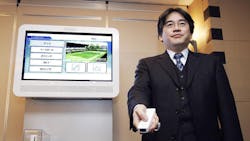Where Will Nintendo Go After Losing its CEO?
Anthropologists and media think pieces like to refer to millennials as digital natives, and we are, I suppose, at least compared to our parents and some of our older siblings. But those of us born during the early years of the generation, say 1982 to 1987, were not raised with technology all around us. Our childhoods were still relatively old-fashioned.
My parents owned three televisions, two record players and a radio during much of my childhood. There were no cell phones in the car or around the house until I was 9, no computers until I was almost 11.
But Nintendo, Nintendo was always there.
I was lucky enough to unwrap a Nintendo Entertainment System the Christmas after I turned 5, and I was luckier to upgrade to a Super Nintendo the night I turned 9. Before I ever grabbed a hold of a Samsung Note 4 phone or a Suunto Ambit 3 watch, before I even knew my way around a QWERTY keyboard, Nintendo was a part of my life.
Which is why the news out of Japan this weekend cut a little deeper than most stories about technology and executives. Satoru Iwata died Saturday, just 55, because of complications from a tumor in his bile duct. He had worked as the president and CEO of Nintendo for the last 13 years, and he had done, by all accounts, a pretty good job. Not a perfect job, but, hey, nobody’s perfect, least of all Mario, Donkey Kong and any other video game character with multiple lives and a restart button.
Iwata was the first person outside of the Yamauchi family to run Nintendo — which was formed back in 1889 as a trading card company – and he helped develop and usher in the handheld DS and the revolutionary Wii. Those two consoles combined have sold more a quarter of a billion units around the world and sparked a rise in the company’s stock, nearly doubling during the days when whole families would circle the television to bowl, play tennis and while away the hours with Wii Sports.
(Nintendo’s stock peaked around 70,000 yen in November 2007, dropped to 21,000 in November 2009, then under 10,000 in December 2012, before rebounding earlier this year to close to 23,000. Its reported net profit for the year to March was about 41.8 billion yen, or $340 million, though its revenue slipped 3.8%.)
Before that, he designed games as part of the HAL Laboratory – the legendary Kirby among them – and played a part in developing Pokemon Gold and Silver, two of the five best-selling games ever released for Game Boy or Game Boy Color. (Tetris, which was included as part of the original Game Boy package, tops that list.) He loved games – he loved technology, really – and he was a big part of why so many people today love them, too.
Iwata did not create Mario or Luigi, Donkey Kong or Link — and more recently, he resisted the development of Nintendo games for mobile devices, holding tight to the idea of console exclusivity — but he helped change how we play games and, more important, how we interact with technology.
Where will Nintendo go from here? The company might choose to replace him from within — perhaps with Genyo Takeda, the GM of its integrated research division and its acting representative director, or Shigeru Miyamoto, who created Mario and would serve more as a figurehead leader — or go in a different direction, though that seems unlikely for a company that had been headed been one family for its first 113 years.
Either way, stock might tumble again, finances might dim, and Nintendo could lag more behind Sony and Microsoft. Wii U failed, after all, selling fewer than 10 million units since its November 2012 release, and even though the company has enough cash to run for close to four decades, its model could change.
Will the company continue to make memorable, perhaps even life-altering games? As a millennial, as someone who became a digital native in large thanks to Nintendo, I hope so. I remain optimistic for its future because of its past — because of people like Iwata brilliant enough to make us fall in love with manufactured plastic and digital pixels.
About the Author
Matt LaWell
Staff Writer
Staff writer Matt LaWell explores news in manufacturing technology, covering the trends and developments in automation, robotics, digital tools and emerging technologies. He also reports on the best practices of the most successful high tech companies, including computer, electronics, and industrial machinery and equipment manufacturers.
Matt joined IndustryWeek in 2015 after six years at newspapers and magazines in West Virginia, North Carolina and Ohio, a season on the road with his wife writing about America and minor league baseball, and three years running a small business. He received his bachelor's degree in magazine journalism from Ohio University.
